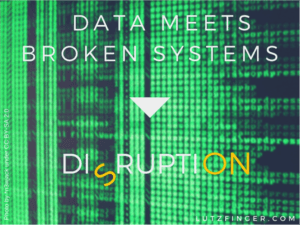Disruption is a big word. I see many startups that want to be ‘disruptive’. But very rarely we see disruption happening suddenly. Big changes do not happen over night. A lot of industries are about to change due to data. We saw in the last 10 years a lot of advancements in the way how we store and process information. This has created the potential for change by predicting the future. Data by itself is useless but using pattern many companies aim to improve their business or to create even a disruptive idea. For disruption to happen we will need two main parts:

- Data is king. Yes, the internet has changed the retail industry but more important it has created a competitive barrier to enter. The world will be soon divided between companies who have data and companies who have not. We will see private equity funds coming that focus only on buying data-heavy assets as well as the revival of the utility companies as they discover their data assets. (Boring is the new sexy)
- Mindshift – or an broken and ineffective system. Incumbents often have a great headstart with data, but they do not use it – thus others do. Why did google buy Nest? To get data access into your house. Why didn’t the Utility companies install smart devices at the home? They did not know that they could have this data or that data can be useful.
The Media industry has changed! The retail industry has change! The Education sector is changing! Which industry will be next? Looking at VC money. The healthcare sector. It fits the structure: there is a lot of data and a broken system.
By Lutz Finger

LUTZ FINGER is Data Scientist in residence at Cornell University and author of the book “Ask Measure Learn”. He is an authority on data analytics and teaches at Harvard Business School a course about Data Driven Thinking. As director at LinkedIn he oversees internal data products as well as LinkedIn’s Economic Graph Challenge.
LUTZ is a highly regarded technology executive and a popular public speaker on business analytics. As co-founder and former CEO of Fisheye Analytics, a media data-mining company, he supported governments and NGOs with data insights. Fisheye Analytics was acquired by the WPP group.
He serves as an advisor at several data-centric corporations in the United States and publishes a Forbes Column. He has an MBA from INSEAD, as well as an MS in quantum physics from TU Berlin (Germany).










